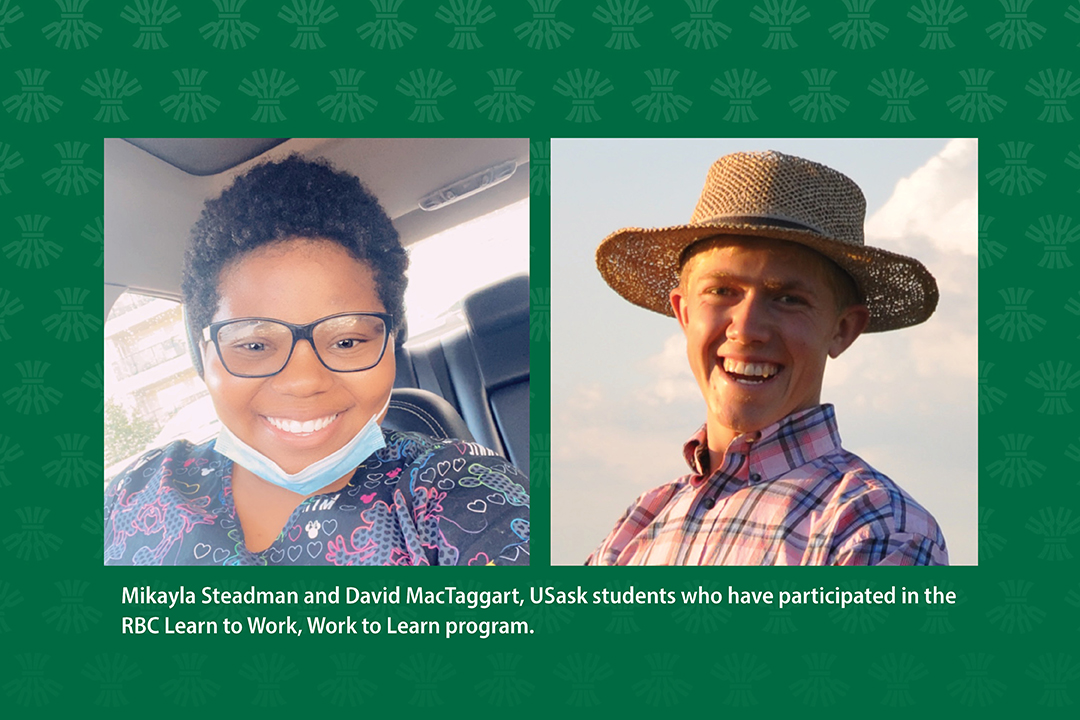
USask students thrive in career transition with support from RBC Future Launch
RBC commits $1 million to expand the RBC Learn to Work, Work to Learn program
By John GraingerWith aspirations to be a military emergency surgeon, Mikayla Steadman, a fourth-year University of Saskatchewan (USask) student in the College of Kinesiology, knows she needs as much knowledge and preparation as possible as she strives toward achieving her dreams.
“I knew the skills I needed to build upon were along the lines of leadership and knowing how to deal with different situations,” said Steadman.
Much like Steadman, David MacTaggart, a current USask graduate student, knew he needed to develop specific professional skills as he moved into the Department of Plant Sciences master’s program in the College of Agriculture and Bioresources to eventually work in the agriculture industry.
“My primary interest is communication and agriculture and being able to get messages across to our farmer audiences, so they can adopt innovation faster and in a way that’s meaningful for their farm,” said MacTaggart.
Through their professors, both Steadman and MacTaggart heard about a pilot program called the RBC Learn to Work, Work to Learn program, which had been initiated through a partnership between USask and RBC Future Launch in 2019.
RBC Future Launch is a 10-year, $500 million commitment to empower Canadian youth for the jobs of tomorrow. With a focus on networking, skills development, practical work experience and mental well-being supports and services, the initiative aims to help break down the barriers facing young people.
The RBC Learn to Work, Work to Learn program is designed to give students a taste of life in the workplace before their university classes are over, while at the same time building transferrable skills like communication, collaboration and enhanced critical thinking that would ultimately lead to improved employability.
Upon completion of the program, Steadman worked at a Saskatoon seniors’ care home, while MacTaggart landed a position with Bayer Crop Science at a field site in rural Saskatchewan.
“It helped me to develop that confidence to be able to communicate effectively with those people that I work with,” said MacTaggart. “And I think that’s a skill that’s quite universal because we’re all so different.”
The successful pilot program began with an initial $300,000 investment from RBC, and over the two-year period, the program reached more than 2,000 students.
Building on that success, RBC has since generously committed $1 million to expand the program at USask to students in other colleges.
“RBC has been a committed partner and long-time supporter of the University of Saskatchewan and our students,” said USask President and Vice-Chancellor Peter Stoicheff. “At the core of their generosity has been a desire to see our students succeed.”
Stoicheff believes the university’s role is to provide students with the knowledge and skills they need to succeed after graduation and go on to make a difference in communities, both here and around the world.
“In that way, our students can be what the world needs,” he said.
RBC Regional President Kim Ulmer believes creating connectivity and collaboration builds a solid foundation that enhances the students’ career options.
“RBC is fortunate to have the University of Saskatchewan as an innovative partner and friend in preparing Canada’s next generation of leaders for a dynamic future that awaits them,” said Ulmer. “We feel strongly that it is important to not only give back, but show up in meaningful ways, contributing however we can.”
Nancy Turner, director of teaching and learning enhancement at USask, has been thrilled with the program thus far, having had the opportunity to work closely with many of the staff and students involved.
“This program has been very well received by students and our industry partners alike, adding to and amplifying the skills acquired during employment and developing many foundational skills that are critical for career success,” said Turner. “None of this would have been possible without the support of RBC.”
She said students who have finished the RBC Learn to Work, Work to Learn program have come away with a sense of growth and are ready to tackle a real career after graduation.
“Additionally, the experience has helped them identify career paths, become more skilled in the process of getting a job, and ease into work,” said Turner.
Both Stoicheff and Ulmer believe students will leave the program positioned to succeed in their future endeavours, but it is Steadman who knows she has an advantage over others because of her participation in the program.
“I would say to RBC, thank you very much for the opportunity of participating in such a wonderful program. I believe it has improved my life greatly.”
*******
Because of this generous gift, USask is currently expanding the RBC Learn to Work, Work to Learn program to more colleges to be able to reach more students from across the university. To find out more about the program, please contact Program Lead Alicia Wehrkamp at alicia.wehrkamp@usask.ca

